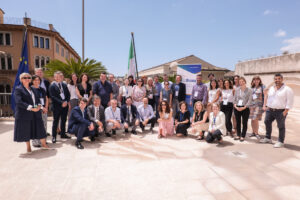
Hosted by the Italian partners and with the support of the Italian NRCP (National Office Against Racial Discrimination- UNAR), the meeting gathered EURoma partner authorities from 14 Member States, as well as representatives from the European Commission and of other relevant Italian stakeholders.
On 6-7 June the EURoma Network organised its first meeting of 2024 in Rome (Italy), hosted by Italian partners and with the support of the Italian National Roma Contact Point (National Office Against Racial Discrimination- UNAR).
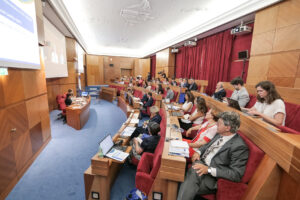 The meeting gathered EURoma partner authorities (notably National Roma Contact Points and public authorities in charge of the Funds) from 14 EU Member States, as well as representatives of the European Commission and of the European Competence Center for Social Innovation (Lithuanian European Social Fund Agency-ESFA), which is providing support for certain activities of the Network. The second day of the meeting, devoted to analyse the Italian context as regards the situation of Roma and the use to EU Funds to address it, was also open to other relevant Italian stakeholders.
The meeting gathered EURoma partner authorities (notably National Roma Contact Points and public authorities in charge of the Funds) from 14 EU Member States, as well as representatives of the European Commission and of the European Competence Center for Social Innovation (Lithuanian European Social Fund Agency-ESFA), which is providing support for certain activities of the Network. The second day of the meeting, devoted to analyse the Italian context as regards the situation of Roma and the use to EU Funds to address it, was also open to other relevant Italian stakeholders.
It addressed a wide range of topics, including the consideration of Roma equality and inclusion in European Cohesion Policy Funds (both in the implementation of the 2021-2027 programming period and in the discussions on the post-2027 period), the Child Guarantee, the relevant EU policy and legal developments as regards Roma equality and inclusion, and the EURoma work plan and next activities for 2024-2025. Partners also had the opportunity to get an insight in the Italian context and meet other relevant Italian stakeholders in the context of the “Country Monograph” organised the second day of the meeting.
Opening of the meeting
The meeting was opened by Fabrizio D’Ascenzo, on behalf of the Inspectorate and Security Service Rome (INAIL), where the meeting was hosted, and Agnese Canevari of the National Office Against Racial Discrimination (UNAR)/Italian National Roma Contact Point, which has worked closely with EURoma Technical Secretariat to organise the meeting.
European Cohesion Policy Funds and Roma equality and inclusion
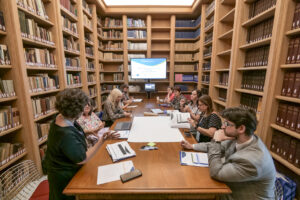 A large part of the meeting was devoted to looking at the state-of-play and the actual implementation of the 2021-2027 ESF+/ERDF programmes. Exchange and mutual learning on this phase of the Funds’ cycle is crucial to ensure that the positive picture as regards the consideration of Roma equality and inclusion in the programming documents of the 2021-2027 European Cohesion Policy Funds (to which EURoma contributed with the publication of the “EURoma Checklist for the Effective Inclusion of Roma Interventions within European Cohesion Policy Funds programming 2021-2027”) is translated into practice and there is an actual and effective implementation of the actions planned and with a real impact.
A large part of the meeting was devoted to looking at the state-of-play and the actual implementation of the 2021-2027 ESF+/ERDF programmes. Exchange and mutual learning on this phase of the Funds’ cycle is crucial to ensure that the positive picture as regards the consideration of Roma equality and inclusion in the programming documents of the 2021-2027 European Cohesion Policy Funds (to which EURoma contributed with the publication of the “EURoma Checklist for the Effective Inclusion of Roma Interventions within European Cohesion Policy Funds programming 2021-2027”) is translated into practice and there is an actual and effective implementation of the actions planned and with a real impact.
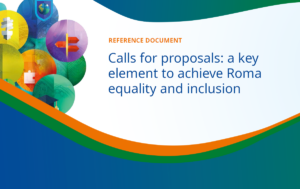 Partners exchanged on critical elements related to the implementation (including challenges and difficulties, areas of concern, positive aspects…) as well as on the state-of-play and characteristics of the calls for proposals in their countries. The calls for proposals have proved to the be one of the determining elements for the success in the implementation. On the one hand, they serve to translate what is established in the programming documents into practice. On the other, the way the calls are designed and planned determine to a great extent the characteristics of the projects/interventions that will be selected and implemented as well as their potential efficiency, effectiveness and impact (see EURoma Reference Document on calls for proposals).
Partners exchanged on critical elements related to the implementation (including challenges and difficulties, areas of concern, positive aspects…) as well as on the state-of-play and characteristics of the calls for proposals in their countries. The calls for proposals have proved to the be one of the determining elements for the success in the implementation. On the one hand, they serve to translate what is established in the programming documents into practice. On the other, the way the calls are designed and planned determine to a great extent the characteristics of the projects/interventions that will be selected and implemented as well as their potential efficiency, effectiveness and impact (see EURoma Reference Document on calls for proposals).
While focusing on the implementation, EURoma partners also reviewed the future as the discussions on the Cohesion Policy beyond 2027 in order to better understand the state-of-play of discussions and to consider how EURoma Network and its partners can contribute to promote that Roma equality and inclusion are fully taken into account when considering the future of Cohesion Policy.
Child Guarantee and Roma children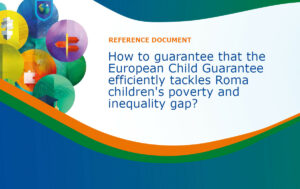
Another key topic addressed was whether and how the Child Guarantee is reaching Roma children in EURoma partner countries.This is particularly relevant now that the Member States are submitting their reports on the implementation of their National Plans to the European Commission. The Reference Document on Child Guarantee released by EURoma when the Child Guarantee was launched already identified critical aspects to consider in the context of the Child Guarantee National Action Plans and of the 2021-2027 programming period of the European Cohesion Policy Funds 2021-2027 (notably ESF+ and ERDF) in order to guarantee that they contribute to efficiently tackle the poverty and inequality gap currently faced by Roma children.
Relevant EU policy and legal developments as regards Roma equality and inclusion
An update was prvided on key relevant EU policy and legal develiopments as regards Roma equality and inclusion, including the report on the implementation of National Roma Strategic Frameworks (NRSFs) that will be soon released by the European Commission and the two Directives recently adopted by the European Council to strengthen the equality bodies.
Furthermore, representatives of Spanish and Hungarian NRCPs shared with partners information on the relevant developments as regards Roma equality and inclusion in the framework of the past Spanish EU Presidency (July-December 2023) and the upcoming Hungarian EU Presidency (July-December 2024).
EURoma work plan and next activities
Partners also had the opportunity to review and agree on the work plan of the EURoma Network for 2024 and 2025, which takes into account, among others, the outcomes of the evaluation of the work of the EURoma Network in the period 2014-2020.
Country monograph: Looking at the Italian case
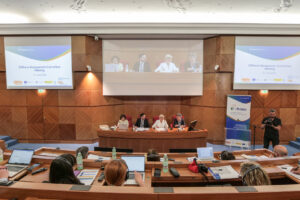 The second day of the meeting was devoted to getting an insight into the Italian context, in particular on how Roma equality and inclusion is being addressed and on how the different funding sources are contributing to it.
The second day of the meeting was devoted to getting an insight into the Italian context, in particular on how Roma equality and inclusion is being addressed and on how the different funding sources are contributing to it.
The initial presentations delivered by the National Office Against Racial Discrimination (UNAR)/Italian NRCP on the situation of Roma and Sinti in Italy and on the National Roma and Sinti Strategy 2021-2030 and financial opportunities available to achieve its goals provided a picture of the framework for action.
This was followed by a review by representatives of the authorities in charge of some of the Italian programmes 2021-2027 (including the Programme for Inclusion and Fight against Poverty, the Programme Metro+ and southern medium cities and the Equity and Health Programme) on how ESF+ and ERDF resources are being used for Roma equality and inclusion.
The work through regional plans and local experiences in overcoming settlements as well as the work on measuring housing change was also addressed with key Italian stakeholders.

